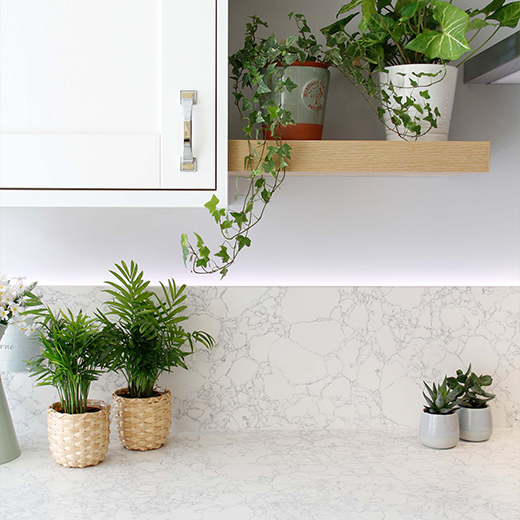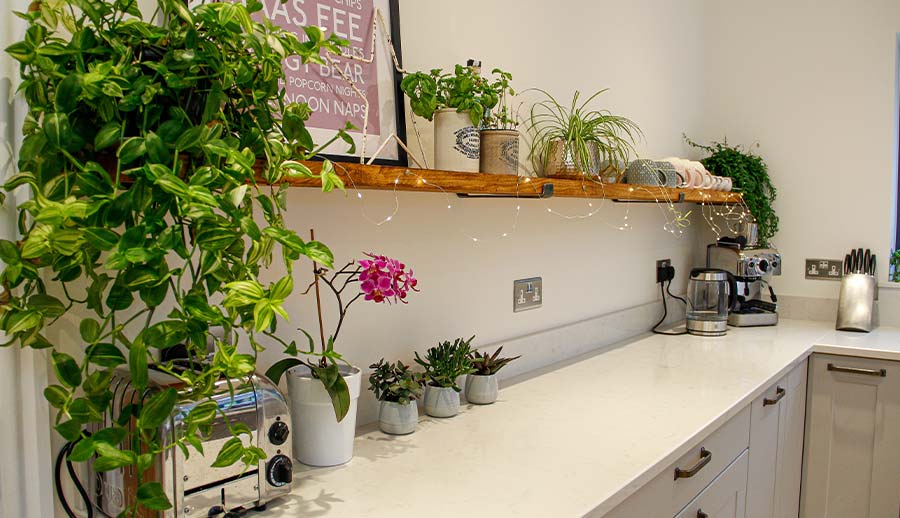In recent years, the concept of incorporating plants into home decor has evolved tremendously, and modern kitchens are no exception. As someone who has always had a passion for creating inviting spaces, I’ve found that adding plants to my kitchen not only beautifies the area but also creates a nurturing and lively atmosphere. In this comprehensive guide, we’ll explore various aspects of modern kitchen plant decor, including styles, benefits, care tips, and more.
The Benefits of Incorporating Plants in Your Kitchen
Plants do more than just add aesthetic appeal; they also offer numerous practical benefits:
- Improved Air Quality: Plants can naturally purify the air, absorbing toxins and releasing oxygen, which can lead to a healthier kitchen environment.
- Enhanced Mood: Studies show that indoor plants can reduce stress and anxiety, making your culinary space more enjoyable.
- Fresh Ingredients: Having herbs or edible plants on hand allows for fresh seasoning in your meals.
- Aesthetic Appeal: Plants add color and texture, breaking up the monotony of kitchen design.
Choosing the Right Plants for Your Kitchen
Considerations for Plant Selection
When selecting plants for your kitchen, consider the following factors:
- Light Requirements: Assess how much natural light your kitchen receives; choose plants that thrive in that environment.
- Space Constraints: Consider the size of your kitchen and choose plants that will fit without overcrowding the space.
- Maintenance Level: Evaluate your lifestyle to determine whether you want low-maintenance plants or if you’re open to more care-demanding varieties.

Best Plants for Modern Kitchen Decor
Here’s a table highlighting some of the best kitchen plants based on light requirements, maintenance, and appearance:
| Plant Name | Light Requirement | Maintenance Level | Benefits |
|---|---|---|---|
| Herbs (Basil, Parsley, Mint) | Bright, direct light | Moderate | Fresh seasoning, fragrant |
| Spider Plant | Indirect light | Low | Air purifier, resilient |
| Pothos | Low to bright indirect light | Low | Air purifier, trailing vine |
| Aloe Vera | Bright, indirect light | Low | Medicinal properties, unique texture |
| Snake Plant | Low to bright light | Low | Air purifier, architectural |

Designing a Modern Kitchen with Plants
Different Styling Approaches
When it comes to decor, there are several approaches you can take:
Minimalist Approach
A minimalist kitchen decor focuses on simplicity. A few strategically placed potted herbs or succulents on windowsills or countertops can seamlessly integrate nature into your design.

Bohemian Style
A bohemian style allows for a more eclectic mix of plants, including hanging varieties, tall floor plants, and trailing vines. This style encourages a playful and relaxed atmosphere.
Industrial Chic
Complementing the contemporary industrial look with greenery can soften hard surfaces. Consider using metal planters or wooden shelves to display your plants.

Functional Decor
Incorporating plants that offer practical benefits, such as herbs, can be both decorative and functional. Hanging planters or vertical gardens could create a vibrant yet useful backdrop.
Creative Ways to Display Plants in Your Kitchen
Popular Display Ideas
Here are some creative ways to showcase your kitchen plants:

- Window Sills: Perfect for herbs and small plants that thrive in direct sunlight.
- Hanging Planters: Ideal for trailing plants, creating vertical space and visual interest.
- Wall Shelves: Use open shelving to create a dedicated plant corner.
- Tiered Stands: Utilize tiered plant stands for a variety of sizes and heights.
Vertical Gardens: The Future of Kitchen Decor
Vertical gardens are gaining popularity as they maximize space and can serve as stunning focal points. They can be created using simple wall-mounted systems that allow you to cultivate small herbs and plants vertically.

Plant Care Tips for Your Kitchen Greenery
General Maintenance Guide
Taking care of your kitchen plants doesn’t have to be daunting. Here are some key care tips:
- Watering: Check soil moisture regularly; overwatering is a common mistake.
- Fertilizing: Use a balanced, water-soluble fertilizer every 4-6 weeks during the growing season.
- Pruning: Regularly prune dead or yellowing leaves to keep plants healthy and encourage growth.
- Pest Control: Keep an eye out for pests; neem oil is a natural option for treatment.

Personal Experience: My Journey with Kitchen Plants
When I first started incorporating plants into my kitchen, it felt overwhelming. However, I soon discovered that caring for them became a part of my daily routine that I genuinely enjoyed. One memorable experience was when I used fresh basil from my windowsill planter to enhance a pasta dish. The fragrant aroma was unparalleled, and it made my cooking feel more special.
FAQs About Modern Kitchen Plants Decor
What are the best plants for low-light kitchens?
Some great options for low-light kitchens include Snake Plants, Pothos, and ZZ Plants. These varieties are resilient and thrive even in less-than-ideal lighting conditions.
How do I prevent pests on my kitchen plants?
Regularly inspect your plants for pests, maintain proper watering habits, and consider using natural pest control methods like neem oil or insecticidal soap.
Can I grow herbs indoors for cooking?
Absolutely! Many herbs, such as basil, parsley, and mint, thrive indoors and can provide fresh ingredients for your meals.
How often should I water kitchen plants?
Watering frequency depends on the type of plant and environmental conditions. Generally, most indoor plants prefer to dry slightly between waterings.
Are there any edible plants that are easy to grow in the kitchen?
Yes! Herbs like basil, cilantro, and chives are easy to grow in a kitchen setting. You can also try growing mini peppers or salad greens.
Conclusion
Incorporating modern kitchen plants into your decor can transform your culinary space into a vibrant and inviting area. By considering the right plants, display methods, and care tips, you can create a kitchen that not only looks good but feels good to be in. My journey with kitchen plants has not only elevated my cooking but also added a touch of personality to my home. I encourage you to explore this green trend and discover how plants can enrich your kitchen experience.